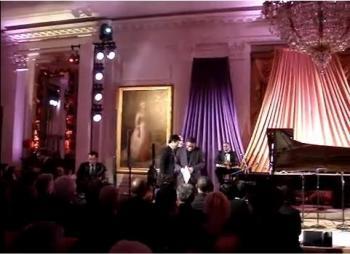The Hong Kong government’s refusal to grant visas to key members of a performing arts group has forced a very public cancellation of the group’s shows in Hong Kong, mounting local protests, and led analysts to question how much autonomy Hong Kong really has from mainland China. The issue may also be part of a wider push on the part of the Chinese regime to assert itself in the realm of culture, according to a prominent China scholar.
The New York-based Shen Yun Performing Arts, which promotes an authentic representation of traditional Chinese culture, proudly boasts practitioners of the Falun Gong spiritual discipline among its performers. Its shows epitomize what the Chinese Communist Party has tried to suppress in China— and now in Hong Kong as well—according to supporters. Shows were scheduled in Hong Kong in early February, but now ticket holders will be waiting in line for a refund instead.
On the surface, the CCP honors the principle of “one country, two systems”, but it still imposes control over Hong Kong on critical issues, according to Yu Ying-Shih, Professor Emeritus of History and East Asian Studies at Princeton University .
According to Dr. Yu , a well known historian of China and a recipient of the 2006 Kluge Prize, the CCP has been intensifying its efforts to expand its influence beyond the mainland and autonomous regions. This includes using international Chinese associations under the guise of promoting Chinese culture to expand its influence in Western society.
Yu said that the CCP works to stir up feelings of nationalism in the younger generation and has trained overseas Chinese to equate patriotism with loyalty to the CCP’s political power.
Web sites run by many Chinese student organizations also double as outlets for pro-CCP propaganda. Students are frequently offered incentives for promoting and cooperating with the Party .
Yu believes that some students have “turned off their conscience” in exchange for personal advancement, but others are cooperating with the CCP out of fear.
“Those overseas Chinese that are afraid need to have confidence. Don’t be fooled by the CCP’s false image of strength,” Yu said.
“With protests increasing and discontented citizens [in China] gaining momentum, there will certainly be a day when the CCP will weaken and fall.”
The CCP is aware that its power abuses and rights violations are unpopular in the West, and that rallying support for Marxism and Maoism is improbable, he said. Consequently, it has taken the approach of promoting the Chinese humanities as a way to gain legitimacy and advance its agenda.
By the end of Oct. 2009, the CCP had set up at least 280 Confucius Institutes in 87 countries.
While the CCP claims that the Confucius Institute system serves to promote Chinese culture and language, Dr. Yu and other analysts believe the true purpose of these institutes is for infiltrating political and academic activities in other countries.
“In mainland China, the CCP is instilling people with party culture, making the real, traditional culture disappear.
“I definitely don’t believe the CCP has any connection to traditional culture--it’s only using traditional culture,” Yu said.
“No matter what the CCP does, its sole purpose is to maintain power, and everything becomes a tool for it to maintain power.”
Southern Weekly, an influential newspaper in China, reported two years ago that a Canadian scholar accused the Confucius Institutes of being engaged only in intelligence work. Other groups have made similar accusations against the organization.
Read the original Chinese article.
The New York-based Shen Yun Performing Arts, which promotes an authentic representation of traditional Chinese culture, proudly boasts practitioners of the Falun Gong spiritual discipline among its performers. Its shows epitomize what the Chinese Communist Party has tried to suppress in China— and now in Hong Kong as well—according to supporters. Shows were scheduled in Hong Kong in early February, but now ticket holders will be waiting in line for a refund instead.
On the surface, the CCP honors the principle of “one country, two systems”, but it still imposes control over Hong Kong on critical issues, according to Yu Ying-Shih, Professor Emeritus of History and East Asian Studies at Princeton University .
According to Dr. Yu , a well known historian of China and a recipient of the 2006 Kluge Prize, the CCP has been intensifying its efforts to expand its influence beyond the mainland and autonomous regions. This includes using international Chinese associations under the guise of promoting Chinese culture to expand its influence in Western society.
Yu said that the CCP works to stir up feelings of nationalism in the younger generation and has trained overseas Chinese to equate patriotism with loyalty to the CCP’s political power.
Web sites run by many Chinese student organizations also double as outlets for pro-CCP propaganda. Students are frequently offered incentives for promoting and cooperating with the Party .
Yu believes that some students have “turned off their conscience” in exchange for personal advancement, but others are cooperating with the CCP out of fear.
“Those overseas Chinese that are afraid need to have confidence. Don’t be fooled by the CCP’s false image of strength,” Yu said.
“With protests increasing and discontented citizens [in China] gaining momentum, there will certainly be a day when the CCP will weaken and fall.”
The CCP is aware that its power abuses and rights violations are unpopular in the West, and that rallying support for Marxism and Maoism is improbable, he said. Consequently, it has taken the approach of promoting the Chinese humanities as a way to gain legitimacy and advance its agenda.
By the end of Oct. 2009, the CCP had set up at least 280 Confucius Institutes in 87 countries.
While the CCP claims that the Confucius Institute system serves to promote Chinese culture and language, Dr. Yu and other analysts believe the true purpose of these institutes is for infiltrating political and academic activities in other countries.
“In mainland China, the CCP is instilling people with party culture, making the real, traditional culture disappear.
“I definitely don’t believe the CCP has any connection to traditional culture--it’s only using traditional culture,” Yu said.
“No matter what the CCP does, its sole purpose is to maintain power, and everything becomes a tool for it to maintain power.”
Southern Weekly, an influential newspaper in China, reported two years ago that a Canadian scholar accused the Confucius Institutes of being engaged only in intelligence work. Other groups have made similar accusations against the organization.
Read the original Chinese article.


